“If We Don’t Preserve It,
There’s No Other Resource”
The Rochester Museum & Science Center Ensures
Local Black History Will Always Have a Voice
Where to start? With the late Howard W. Coles, a Rochester, New York journalist, author, publisher, broadcaster, civil rights champion, real estate agent, insurance salesman, court attendant, public housing advocate and loving father? With his only daughter, Joan Coles Howard, who has furthered Coles’ legacy of community activism and ensured that his efforts have been protected, preserved and digitized to tell the story of six decades of Rochester’s Black community? With Coles’ The Frederick Douglass Voice (also known as The Voice), one of New York State’s longest running Black-owned newspapers at more than 60 years in circulation? Or with the Rochester Museum & Science Center (RMSC), the repository and portal for public access to much of Coles’ physical and digital archives?
Each are an integral part of preserving the journey of Rochester’s vital Black and African American history and each has its own fascinating story. I strongly encourage readers to click on the links available throughout the post to gain a fuller picture of the impact Howard W. Coles had on his community as well as on generations to come.
Howard W. Coles
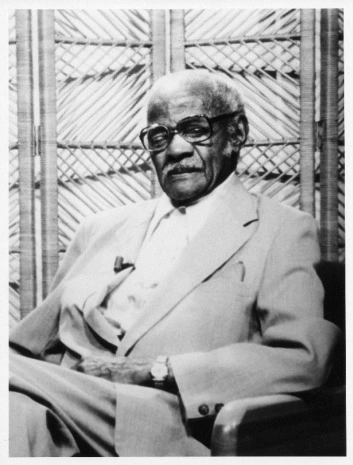
From the Howard W. Coles Collection,
Rochester Museum and Science Center, Rochester, NY
After speaking with Stephanie Ball, archivist and librarian at Rochester Museum & Science Center, about digitization of The Voice, my next step was to find out more about its creator, Howard W. Coles. Five minutes quickly became five hours as one article led to another; my interest piqued with each new bit of information.
What struck me most as I delved into my research was not Coles’ unwavering energy, perseverance and ability to use ALL of his talents – often simultaneously – but the reminder that one person with a passion can make a difference. Not wealthy, not well-connected, not famous, Coles was the grandson of a former slave with a hero: Frederick Douglass. Coles’ personal experience and understanding of racial injustice was coupled with his admiration of a man that fought for equality using intellect, the written word, his voice and the unique “something” that pushes a man to do versus just think. In Coles case, that “doing” resulted in – among many things – a 60-year newspaper run, the reporting of which is today being used to inspire and influence future generations of all races.
A more comprehensive biography and a description of how Coles’ personal collection came to the RMSC can be found here.
Joan Coles Howard
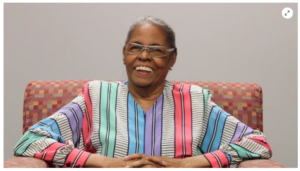
A writer, editor and community activist in her own right, Joan Coles Howard has made it her mission over the past two decades to preserve her father’s legacy as well as to make the past relevant to those who will blaze trails in the future through her work with the Teen Empowerment Center in Rochester.
According to a recent NPR interview, Coles Howard noted that The Voice will allow young people to “be able to look back and some of them will recognize their forebears and know that we were doing things, we were a community, we were a village.”
In mid-1998, about two years after her father’s death, Coles Howard worked with staff at the RMSC to determine the historic value of Coles’ archives, which consisted of two distinct collections: personal papers and ephemera (collected materials) relevant to Rochester’s Black history. In 1999, Coles Howard and her daughter, Shelaine Lockhart Peters, signed a deed of gift, donating the collections to RMSC, thus ensuring their permanent preservation.
The Frederick Douglass Voice (aka The Voice)
This brief audio interview transcript between Reclaiming the Narrative* (RTN) contributor Leslie Hannon and Joan Coles Howard gives an excellent synopsis of The Frederick Douglass voice – its inception, its purpose and its place in history.
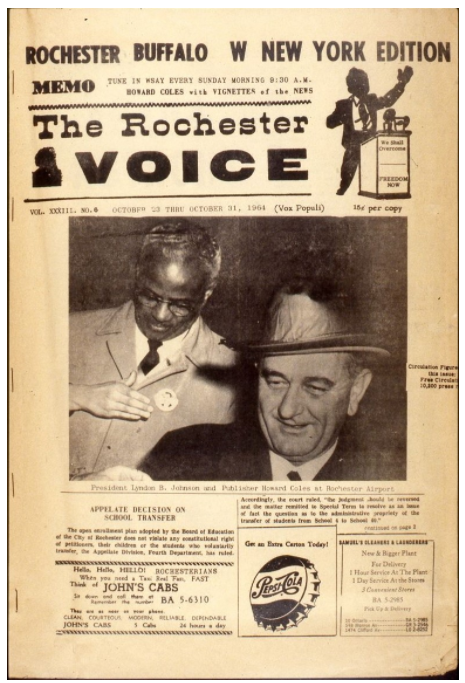
In (very) short, The Voice, which lists Frederick Douglass as “Editor in Eternae,” peaked at approximately 10,000 printed copies per issue and ran weekly or – more accurately – as financing allowed from 1933-1996. It is the longest running Black-owned newspaper in Rochester and records an unprecedented era in history that saw Black and Brown citizens fighting for basic civil rights while at the same time seeking to establish and define themselves within – and as – their own communities.
Stories and coverage ran the gamut from neighborhood happenings and society news to the far bigger issues of housing equality, migrant worker conditions and legal fairness. In a 1944 editorial, Coles sums up that that The Voice was there to chronicle “the history of your lives and (write) the epitaph of your graves.”
RMSC and Crowley
The final piece of the story is the role of the Rochester Museum & Science Center. With 350 editions of The Voice, RMSC holds the largest known collection of the newspaper, among other Coles artifacts. Spurred by Joan Coles Howard and an unexpected Rochester Regional Library Council grant opportunity to have the collection digitized, Ball contacted The Crowley Company to learn about our digitization services.
Says Ball, “I interviewed several prospective service bureaus and found a comfort level with Meghan [O’Brien, a Crowley senior business development manager]. She understood the delicate nature of our holdings. In some cases, there is only a single copy of an issue in existence, so it was important for us to know that it would be treated as irreplaceable.” Ball noted that the pricing she received from various entities fluctuated wildly and that with Crowley, “I liked the approach and the budget.”
Readying the collection for digitization was a bit of a challenge as RMSC typically has “an army of volunteers.” Because of the COVID-19 pandemic, that number was reduced to an army of one and Ball selected the issues to be digitized (several had more than one copy), created the inventory and packaged the newspapers for delivery to Crowley’s Maryland scanning operations. “The scanning seemed to have gone really fast,” laughs Ball, “until I realized I had only sent half of the selected collection.”
On a more serious note, Ball’s words ring true, “The Voice is an amazing compilation of a long period of history in a specific community. If we don’t preserve it, there’s no other resource. Having the papers digitized allows us to both share the newspaper digitally and to preserve the originals because they no longer have to be handled.”

Several of the issues are currently online at Rochester Voices, an offering of the Rochester Public Library (RPL). By mid-2022, the entire collection is expected to be live on the New York State Historic Newspapers’ (NYSHN) site, which gives institutions a free hosting platform for their digital newspaper archives and free access to those archives for end-users. (Side note: NYSHN is also a Crowley client, using Crowley’s Mekel Technology scanners to digitize newspapers on microfilm).
The issues were scanned on an overhead Zeutschel OS Q scanner to 400 dpi grayscale TIFF images and then converted to JPEG and PDF images with Optical Character Recognition (OCR). “The second set of newspapers [those not included in the original shipment] was scanned as full-issue or multi-page PDFs,” says Ball, “and are wonderfully searchable, making online research much more efficient than thumbing through the pages.”
A Voice For Future Generations

During our conversation, Ball gave me a primer on the difference between a museum library and public or academic libraries. “A museum library exists primarily to support the museum staff and its exhibits. The resources run parallel to the museum’s collections.” In the case of the RMSC, the institution opened as a municipal museum in 1914, with the library opening in or around 1920. Ball also noted that RMSC works closely with the team at the Rochester Public Library, which also has a small collection of The Frederick Douglass Voice.
“We collaborate, we don’t compete,” says Ball. “Pre-pandemic, RMSC, RPL and Joan Coles Howard were working together toward the goal of digitization because of the number of regular requests to view The Voice we each receive. The grant opportunity came up with such short notice that we weren’t able to include RPL’s additional issues (about 20), but I fully expect that they will join the rest of the collection online one day soon.”
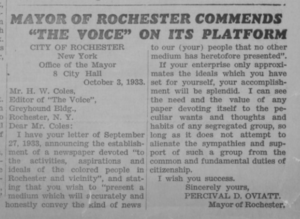
Between the organizations, says Ball, there are “a lot of different groups – news people, students, historians, documentarians, authors, genealogists and others – that need and want to use The Voice collection for research. In the past, they’ve been shocked and daunted by the sheer volume of pages to manually search. As the only organization with access to the full collection and having just standard operating hours, it was sometimes difficult for researchers to schedule time with the collection.” Ball can’t contain her enthusiasm when she says, “This digitization will allow everyone access on their own schedule.”
When I mentioned to Ball how I was so quickly immersed in the story, she understood. “You work with one collection; you dig in. And during the process, you feel that person becomes your friend. I think he [Howard Coles] is a pretty good friend; it feels like you never hit the end of it – there are always more thoughts and more facets. And for me, I appreciate that the collection has brought Joan into my life. What a fantastic person. She’s always fighting for her father’s legacy. “
And isn’t that the legacy of Howard W. Coles, Frederick Douglass and the many who came before and will come after? Fighting the good fight so that others may fight a little less.
* Reclaiming the Narrative is a weekly news radio program produced by community journalists for WXIR 100.9 FM in Rochester NY
Whether Your History is 6, 60 or 600 Years, Crowley Can Help Preserve It
The Crowley Company’s wide selection of services and scanners for digitization are important tools in ensuring that your original archives are protected from wear and tear and that an exact replica of the original can be accessed digitally by a wide or a select audience. Contact your Crowley representative today to learn more about the options for your particular collections and budget. Call (240) 215-0224 or contact us via email.
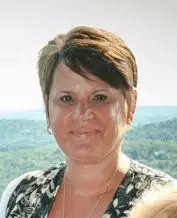
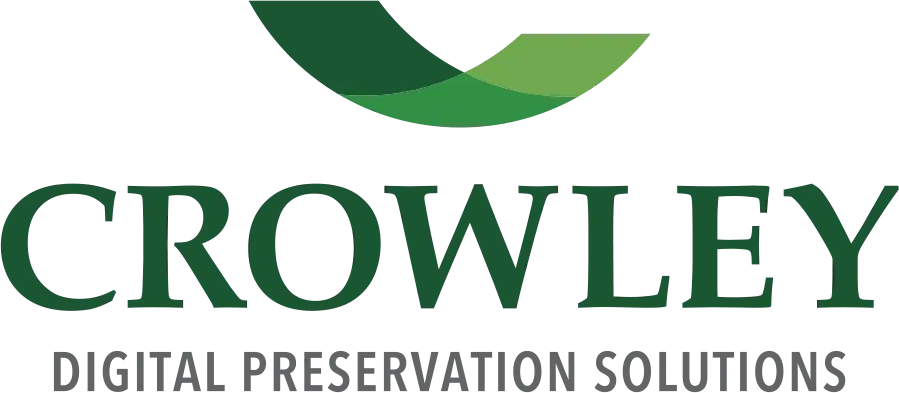
“Our destiny is largely in our hands.” Frederick what a legend
Hello and thank you for reading! Yes, Frederick Douglas was a great historical figure.